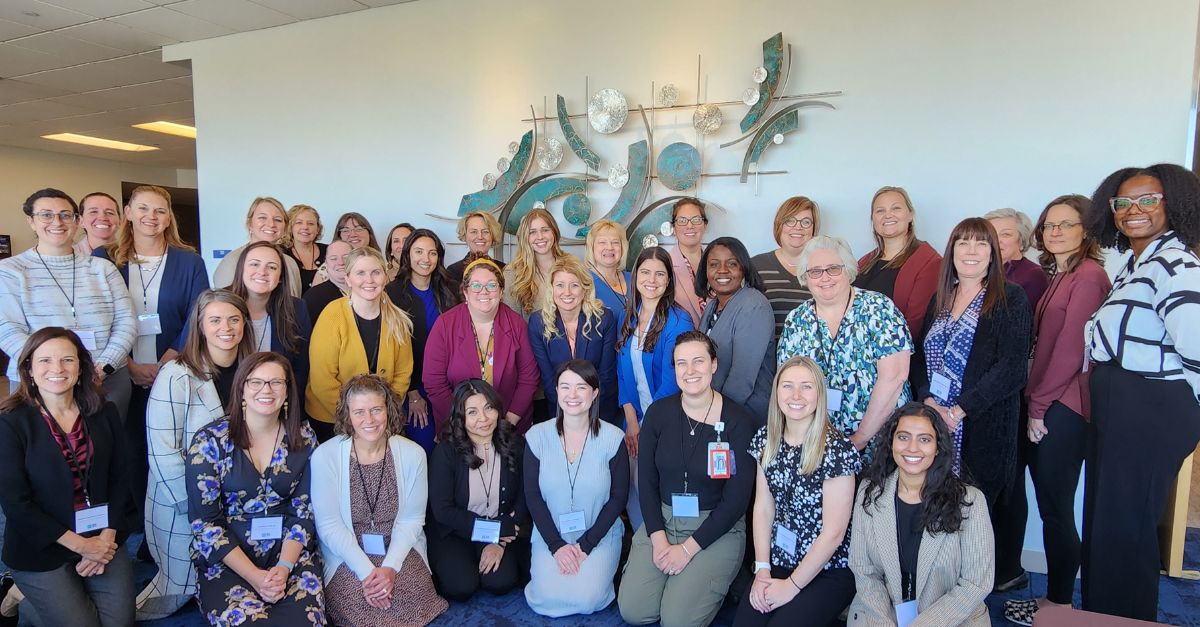As part of the #nursesofPA campaign, the Pennsylvania Action Coalition created 21 short videos featuring nurses from across the state of Pennsylvania. These videos capture the diverse experiences of nurses from all different backgrounds, scopes of practice, geographic locations, ages, and levels of expertise. Nurses share their unique narratives and explore their journeys, challenges, and successes in nursing. These nurses talk about who their most important influences are in keeping them in their profession.
As part of the #nursesofPA campaign, the Pennsylvania Action Coalition created 21 short videos featuring nurses from across the state of Pennsylvania. These videos capture the diverse experiences of nurses from all different backgrounds, scopes of practice, geographic locations, ages, and levels of expertise. Nurses share their unique narratives and explore their journeys, challenges, and successes in nursing. In this video, nurses share who their most important influence is in keeping them in their profession.
As part of the #nursesofPA campaign, the Pennsylvania Action Coalition created 21 short videos featuring nurses from across the state of Pennsylvania. These videos capture the diverse experiences of nurses from all different backgrounds, scopes of practice, geographic locations, ages, and levels of expertise. Nurses share their unique narratives and explore their journeys, challenges, and successes in nursing. In this video, nurses share why they became interested in a nursing career.
As part of the #nursesofPA campaign, the Pennsylvania Action Coalition created 21 short videos featuring nurses from across the state of Pennsylvania. These videos capture the diverse experiences of nurses from all different backgrounds, scopes of practice, geographic locations, ages, and levels of expertise. Nurses share their unique narratives and explore their journeys, challenges, and successes in nursing. In the following videos, nurses share obstacles they overcame in their careers.
Social innovations driven by Pennsylvania nurses were featured in Issue 43 of the Social Innovations Journal. This edition highlighted programs designed to improve health outcomes and the healthcare system in the Commonwealth. Examples include new approaches and collaborative efforts spearheaded by nurses to transform health systems by improving quality, safety, and communication. Innovations in nursing expand beyond technological advancements to new process methods and creative cross-sector partnerships.
The Pennsylvania Action Coalition partnered with the social Innovations Journal, and organized the Social Innovations Journal Symposium at the Free Library of Philadelphia on April 11 to highlight this transformational work.
Read Issue 43 of the Social Innovations Journal

Nurse residency programs assist in preparing nurses to transition from the role of a student nurse to the role of a professional registered nurse into clinical practice. Evidence shows that completing a nurse residency program provides new nurses with the necessary skillset and knowledge to provide safe, high-quality, patient-focused care.
The Pennsylvania Nursing Workforce Coalition (PA-NWC) implements nurse residency programs in response to a key recommendation from the National Academy of Medicine, as outlined in The Future of Nursing: Leading Change, Advancing Health (2011):
"Residency provides a continuing opportunity to apply important knowledge for the purpose of remaining a safe and competent provider in a continuous learning environment."
The Vizient/AACN Nurse Residency Program™ (NRP), developed by Vizient® and the American Association of Colleges of Nursing, supports new graduate nurses through data-driven solutions as they enter clinical practice. The evidence-based curriculum delivers on three key areas: leadership, patient outcomes, and professional development. The NRP helps organizations obtain and maintain Magnet designation by the American Nurses Credentialing Center. The PA-NWC aims to increase the number of health care institutions with the NRP through its strategic partnership with Vizient, Inc.
The PA-NRC was established in 2016 as a partnership of the PA-NWC and Vizient, Inc. to implement residency programs in Pennsylvania and to provide an additional layer of support.
All hospitals and health systems in Pennsylvania that have purchased the Vizient/AACN PA-Nurse Residency Program (NRP) are members of the PA-NRC.
Increase the number of hospitals with nurse residency programs: In November 2016 we formally began our collaboration with Vizient, Inc. and the PA Nurse Residency Collaborative (PA-NRC) was formed. In January 2018 we had 52 hospitals contracted through the PA-NRC. As of August 2025, a total of 78 hospitals are a part of the PA-NRC. We are always signing new hospitals with the goal of bringing the NRP to every hospital across Pennsylvania.
Advance programs throughout Pennsylvania: The Pennsylvania Nurse Residency Collaborative (PA-NRC) advances residency programs and fosters collaboration among hospitals across PA that participate in the Vizient|AACN Nurse Residency Program. The PA-NRC works to address the diverse needs of hospitals and health systems across PA. The PA-NRC provides a forum for best practices and resource sharing at the state level to ensure the success of each program.
Learn why the PA-NRC was founded, who the PA-NRC is, and how we can help you in bolstering the success of your NRP.
Additionally, if you do not have the NRP at your institution, we invite you to watch this webinar to learn more about the PA-NRC and how we could partner to better support nurses in their transition to practice.
Learn More About PA-NRC
| 2019 | 2020 | 2021 | 2022 | 2023 | |
| RNs hired at participating PA-NRC hospitals |
3,870 |
3,684 |
4,697 |
4,953 |
5,416 |
| Turnover rate for RNs at participating PA-NRC hospitals | 10% | 16% | 16% | 11% | 10% |

| Cost avoidance with the national average turnover rate and national turnover costs of $88,000 per nurse to PA-NRC turnover rate | ||||
| 2019 | 2020 | 2021 | 2022 | 2023 |
| National Avg. Turnover rate of 24% | National Avg. Turnover rate of 21.5% | |||
| $47.7 million | $25.9 million | $33.1 million | $57.1 million | $54.8 million |
| Participating Hospitals | |
|
PA-NRC: 78 of 156 acute care hospitals in PA (50%) as of August 2025 |
National Vizient NRP: 661 (June 2022) of 6,129 (May 2023) total hospitals in the U.S. in 2022 (11%) have purchased the NRP |
 The Pennsylvania Action Coalition works actively on initiatives designed to improve consumer experience through better access to high-quality care and fostering interprofessional collaboration to improve quality and safety of care.
The Pennsylvania Action Coalition works actively on initiatives designed to improve consumer experience through better access to high-quality care and fostering interprofessional collaboration to improve quality and safety of care.
Removing the scope-of-practice barriers allows nurses to contribute to a patient-centered, seamless, transformed healthcare system. The Campaign for Action is leading efforts to modernize outdated policies (public and private), change state and federal laws and regulations, and remove cultural and organizational barriers.
Private and public funders, health care organizations, nursing education programs, and nursing associations should expand opportunities for nurses to lead and manage collaborative efforts with physicians and other members of the health care team to conduct research and to redesign and improve practice environments and health systems. These entities should also provide opportunities for nurses to diffuse successful practices. Nurses are at the forefront of redesigning care. Nurses can transform practice to be safer and more responsive to the needs of patients and their families.
 The Pennsylvania Action Coalition (PA-AC) encourages the growth of nurse leaders by providing networking opportunities and education opportunities. The PA-AC also serves as the state liaison to the Nurses on Boards Coalition.
The Pennsylvania Action Coalition (PA-AC) encourages the growth of nurse leaders by providing networking opportunities and education opportunities. The PA-AC also serves as the state liaison to the Nurses on Boards Coalition.
Strong leadership is a critical component of a transformed healthcare system. The nursing profession must produce leaders, who can serve as partners with other health professionals and be accountable for their own contributions to delivering high-quality care.
Nurses need to serve in leadership positions, including on governing boards. Appointing nurses to serve on their boards can help guide management and make improvements. Nurse leaders can provide a valuable perspective that balances the business of healthcare with clinical and patient outcomes. More nurses need to manage health systems and lead health care transformation. They need to position themselves as valued partners in health care improvement.
Nurses on health-related boards can translate their knowledge of bedside care, humanitarian approaches to care and quality & risk management to practice. Collaboration ensures that healthcare is safely delivered to patients and their families, and improves healthcare quality.
Click here to learn more about Pennsylvania Action Coalition's Leadership structure.
Click here to learn about all our initiatives